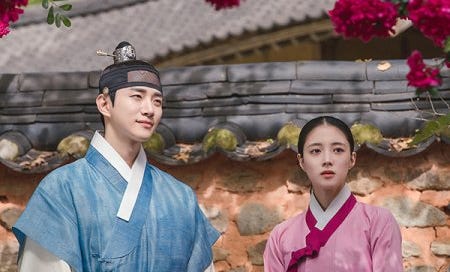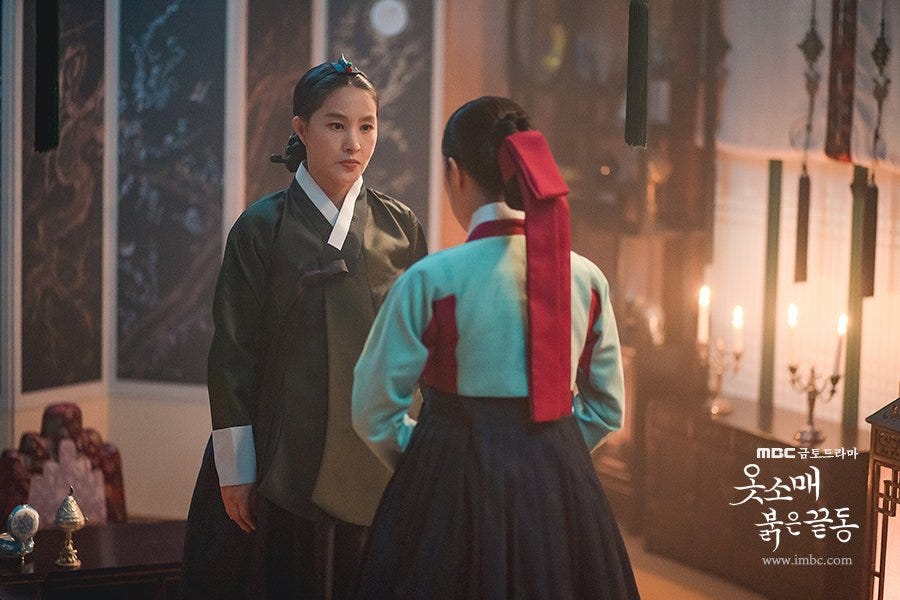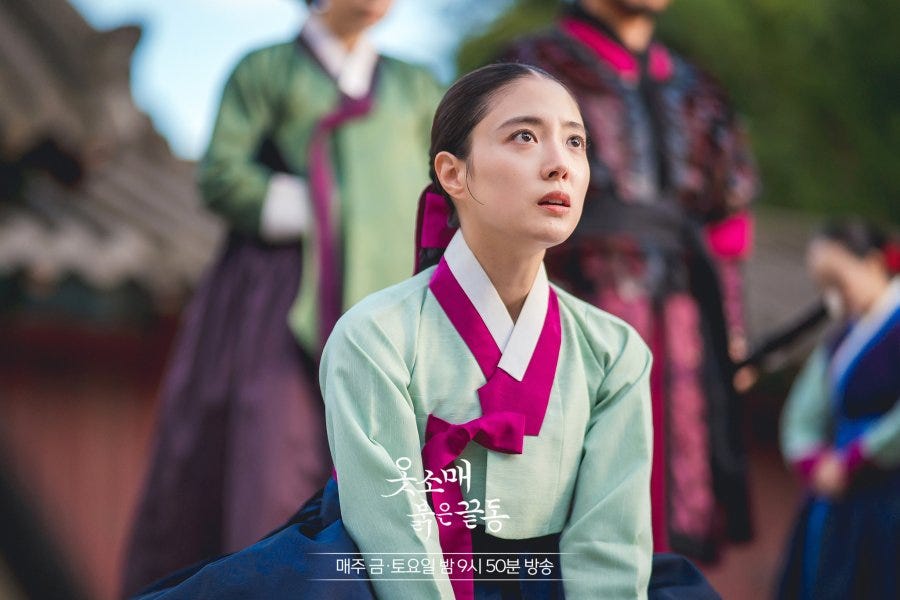The Red Sleeve (2021) Episodes 7-8
Yikes.
An 18th century palace cult has found its way to Joseon and it means to do some real damage to the status quo. Not content with doing the king’s bidding and following customs, the seemingly powerful head court lady has gathered her minions under the banner of unseating the incumbent crown prince, Yi San to install a “better” candidate. Under the cover of darkness and in plain sight, she commands her own army of women in the palace placed strategically to be her spies.
In previous weeks it was becoming clear that a conspiracy was spawning among the head court lady, Princess Hwawan and certain ministers of the royal court to denounce Yi San from being the accepted king’s successor. According to that particular narrative, Prince Sado, the previous crown prince, father of the current one, went violently off his rocker and was purportedly responsible for the deaths of numerous court ladies. If that were indeed the case Head Court Lady Jo’s hostility towards the Son of Sado does seem somewhat understandable, particularly if one believes biological determinism to be a somewhat persuasive justification for wanting to commit treason.
However, in the most recent episode, when cult fever seems to be reaching pitch fervour, we are presented with an equally powerful counter-narrative, prosecuted by a now very elderly court lady who knows something of the history behind Court Lady Jo’s vehemence to play swap successor. It may be more than genetics that’s driving her seditious impulses. Or it may have nothing to do with genetics at all. A deeply personal slight may really be what’s driving her seemingly altruistic agenda. Apparently the late Noble Consort Yeong was a rival for His Majesty’s affections. Consort Yeong had been a former court lady who won the love of a monarch and gave him his heir, the very sad and maybe even sadistic Sado. But that was not the end of that tragedy. According to the elderly Court Lady Park, Sado might not have gone stark raving mad if Court Lady Jo had not been meddling in father-son relations possibly out of jealousy. Harem politics (even years later) might be what’s been driving Court Lady Seo’s agenda rather than some kind of righteous fervour for the greater good.
History has a way of repeating itself. Or so that’s the story being told here. The reason why history repeats itself is because human beings not only never learn from the mistakes of the past but because humans are creatures of emotions adept at self-justification to the point of destruction. Whatever Court Lady Jo’s actual motives are, she is plotting treason under the cloak of saving lives. It’s a familiar story — one that has major reverberations all through history. One that usually means that a lot of people will die before the madness ceases.
In the midst of this brewing maelstrom is another romance between a future king and maid who were fated to meet and fall in love. Their encounters, according to Court Lady Jo, may have been orchestrated by her but there’s a sense of a higher power at work here, “piggybacking off” of Court Lady Jo’s machinations to achieve something beyond her narrower vision of what’s “right”. There’s no doubting in the head court lady’s eye for talent and ability to peg a potential consort for a future king but regardless of what she believes she is only a support act in the story not the protagonist. She can scheme till the cows come home but there are other forces at work which are driving history along a path to a different destination. The relationship between the maid and future king is ultimately not hers to command and see unfold according to her purposes. Now that the two youngsters from a decade before have found each other again, they have/will eschew Court Lady Jo’s interventions in their dynamic because their existing bond rises beyond palace politics. Court Lady Jo may appeal to tribal loyalties but in every crisis love wins the day.
When the present king handed Deok-im a copy of Consort Yeong’s book all those years ago during the consort’s wake, he was in effect passing the torch. It signalled the transfer of the mantle as it were. The love between the old king and his court lady would soon replay for a lonely crown prince who grew up in a dysfunctional family environment with no one he can really trust.
I can say unequivocally and unabashedly that I am watching this for the romance because the writing has done a fine job placing it within the competing political agendas without complicating things unnecessarily with polygons or harems. The political side of things is fairly straightforward and it’s clear where everyone lines up. Nothing’s much of a stretch here. I have no idea if the historical Sung Deok-im was as vital to Joseon politics as this one has been but in the final analysis it really doesn’t matter because here Sung Deok-im’s development seems to parallel Yi San’s ascension story in lock step.
If romance is going to be a vehicle in any drama, it should (one would think) make the effort of depicting a plausible pairing without assuming that the audience will go along for the ride just because they occupy the same publicity poster. Clearly this show is largely about the romance with the palace intrigue (what little of it there is) on hand to give it a bit of colour. It’s not an especially sophisticated sageuk but I don’t think anyone will be that upset about that especially when the characterization in general is doing most of the heavy lifting.





